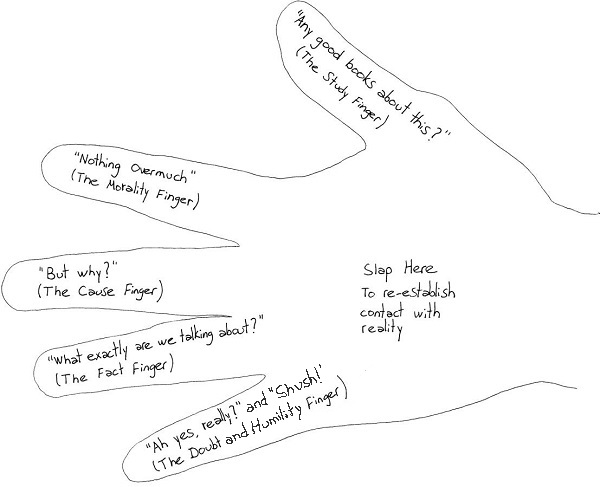
The Philosopher's Glove.
Let's Adore Jesus-Eucharist! | Home >> Philosophy

The Philosopher's Glove.
So, you love Wisdom and have a deep and driving desire to acquire it? I congratulate you, and I want to help you in your quest.
But how could I help you? There appears to be many obstacles to helping someone who wants to acquire Wisdom, among them:
1.1) Unless the blind is to lead the blind, I need to know something about Wisdom myself (and many would testify that my grasp of Wisdom is sometimes, how could I put it... hum... suboptimal!).
1.2) Time and money are scarce, and teaching takes a lot of time and money.
1.3) Remembering abstract things is always difficult.
On the other hand, running away from this problem won't solve it, and some good advice on how to acquire Wisdom is better than nothing. I'll therefore present my best effort, and let you decide whether my advice is good or not.
In my opinion, the first thing you should do is to obtain a highly advanced piece of Wisdom-acquisition technology: the Philosopher's Glove.
Briefly stated, the "Philosopher's Glove" is just a few pieces of advice that you can write on your own hand, one per finger, plus one on your palm:
- On the pinkie: "Ah yes, really?" and "Shush! Be ME quiet!" (The Doubt and Humility Finger)
- On the annular: "What exactly are we talking about?" (The Fact Finger)
- On the middle finger: "But why?" (The Cause Finger)
- On the index: "Nothing overmuch" (The Morality Finger)
- On the thumb: "Any good books about this?" (The Study Finger)
- On the palm: "Slap here!" to re-establish contact with reality
Of course, you don't actually have to write this down on your hand! But it nevertheless might be a good idea to do so at least once, if only to get a good giggle from your family and co-workers! It will also help you memorize these pieces of advice. The best method of Philosophy is useless if you don't remember it and use it!
Each finger has a little quote, but also a name, and a gesture associated with it. Moreover, the sequence of use also goes quite often from the pinkie to the thumb (except for the index which always underlies the scientific process, and the palm which is only used when the mind is "bogged down" in doubt).
3.1) The doubt and humility finger:
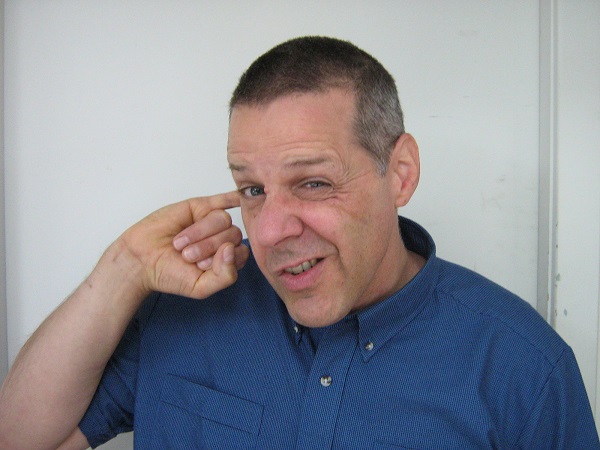
"Ah yes, really?"
The first finger is the pinkie. When somebody says something, or when you read something in a book, your first reaction should normally be "Ah yes, really?" As an associated gesture, you can stick your pinkie in your ear and pretend you are trying to remove one of those pesky little black flies that sometimes crawl into our ears in the summer. Typical black fly noises are: "Studies have proven that...", or "Everybody knows that...", or "Mr. XYZ, an internationally-acclaimed authority, asserts that...", etc. You have to love truth, and therefore purify yourself of false beliefs. One of your best defence mechanisms is a healthy form of scepticism, also known as "methodical doubt".
It's also a good idea to silently say to yourself "Ah yes, really?", before asserting anything, and keeping quiet if it turns out your assertion is unfounded. The smallest of fingers must remind us of humility, so necessary to philosophers. Pride is indeed a great cause of errors: it makes us overestimate our knowledge (Proud people have great difficulty saying three little words: "I don't know"!) and our capacities ("Why start with the little streams when I can jump right away into the sea?"), drives us away from Masters ("Aquiring wisdom is so easy, why listen at the feet of those old dusty philosophers?"), closes us to dialogue ("I'm always right! Why should I let those ignorants speak?"), leads us into the temptation of pretending to be wise in order to look good in front of others (like the sophists), etc.
3.2) The fact finger:
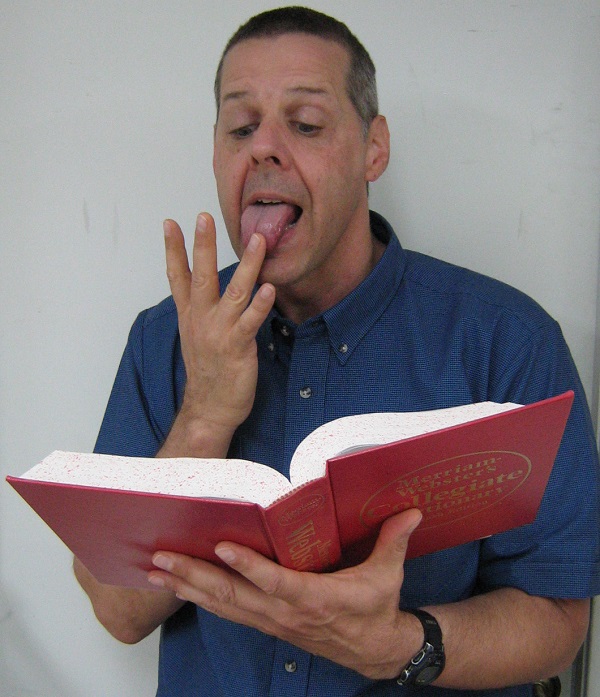
"What exactly are we talking about?"
The second finger is the annular. After you've eliminated the false beliefs, you'll be left with some assertions which appear superficially true. But "appearing superficially true" is not enough for Wisdom. You have to dig down until you reach the evidence, throw out the rumors and the middlemen and find the original sources, get the actual quotes, define the terms used in the discussion, quantify the observations, get it in writing, etc. A more poetic, but less strict way of saying this is: "Any assertion is true or false, depending on how you define the terms". This is why a good associated gesture you can use is to pretend to lick your annular and then turn the pages of a dictionary, as if you were searching for a precise definition. This mental attitude explains why good philosophers insist on having precise definitions, and why they are so prone to answer vague questions with "Well, it depends".

(Source)
Faced with your insistance to clearly define terms at the beginning of a discussion, some persons will show great impatience. Explain to them that you're just doing your job. It's like a good physician, who doesn't start by prescribing some pill for you, before having even given you a physical exam, and before having asked questions (to find out about your symptoms, the time when they appeared, your family history, etc.). In fact, the only thing a physician can do which is worse than giving you a pill without even knowing the disease you have, is to declare you're perfectly healthy, as you're walking into his office! (That is why the second finger of the Philosopher's Glove is preceded by the first finger.)
3.3) The cause finger:
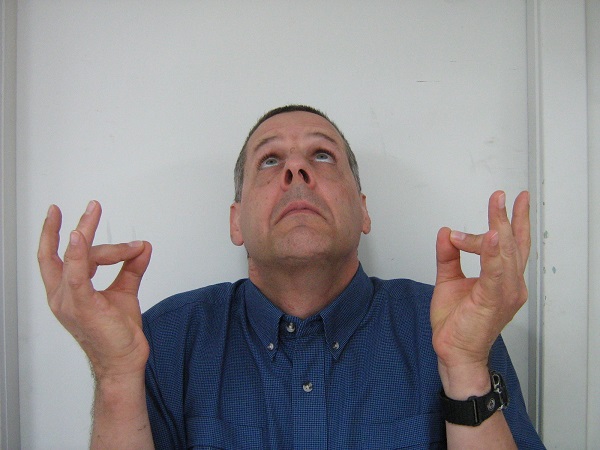
"But why? But why? But why?"
The third finger is the middle finger. Science is not just eliminating awfully bad pseudo-information, and getting the facts straight. Science is deep, certain knowledge, the kind of knowledge that can only be obtained from causes. And Philosophy is knowledge from first and universal causes. An associated gesture could be to touch your thumb with your middle finger, and chant "But why? But why? But why?", in a Zen-like fashion. To become philosophers, when we are faced with a fact, we need to rediscover the amazement of our childhood, and wonder why things are the way they are, and not otherwise. This amazement is the "motor" that causes Science to advance.
3.4) The morality finger:

"Nothing overmuch!"
The fourth finger is the index. The easy gesture to help us remember is to wave our index and say "No! No! No!", like our Mother used to do when we were mischievous. Moral virtue is important for the acquisition of Wisdom, and virtue has been defined as the golden mean between extremes, hence the "Nothing overmuch" quote. We are not pure creatures of Logic, and bad habits can distort our understanding of reality. For example, if you're always drunk, or so lazy you refuse to crack open a book, or so obsessed with sex you can't elevate your intellect above the imagination, you won't be able to acquire Wisdom! (Note that humility is a moral virtue, hence it's "included" in the index, but it's so important for philosophers that it's a good idea to also repeat it on the pinkie.)
3.5) The study finger:
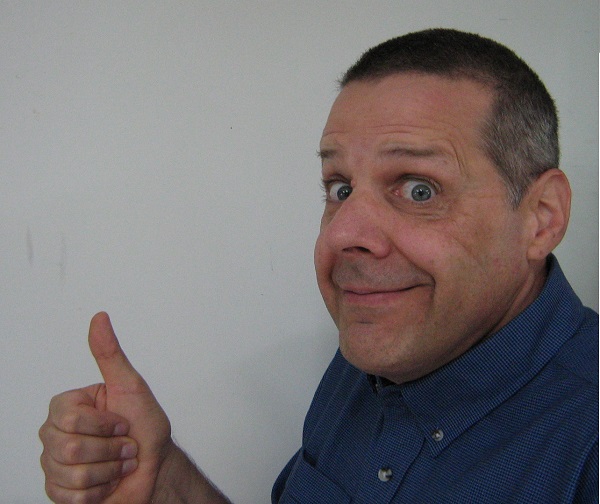
"Any good books about this?"
The fifth finger is the thumb. Not only is it silly to reinvent the wheel, but in Philosophy, it is dangerous to try. Many have gone astray for lack of good teachers. (I recommend Aristotle, Saint Thomas Aquinas and F.-J. Thonnard, but that is a topic of another essay). Many false things have been written, but many true ones too, and we must seek out the best books that have been written on the topic, and study them earnestly. The gesture associated with this finger is just sticking your thumb up with your fist closed, as if you were hitchhiking. You are trying to "hitch a ride" with good books, so you will get to your destination faster and with less effort! But always be wary of bad books that could "pick you up"!
Programmers use the vulgar acronym "RTFM", i.e. "Read The Flippin' Manual", which is another way of reminding ourselves of the importance of starting with information which already exists, that we should know, that would be ridiculous to neglect just because it's biting our leg.
Yet another way of saying the same thing, is the folksy advice to "google it", i.e. submit your question to an Internet search engine. If something breaks (car, sewing machine, computer, etc.), you can often avoid much pain with a few moments of reading something written by a wiser-than-thou, rather than galoping off into a quixotic repair attempt with your eyes blindfolded.
3.6) The palm (i.e. "the Reality Check"):
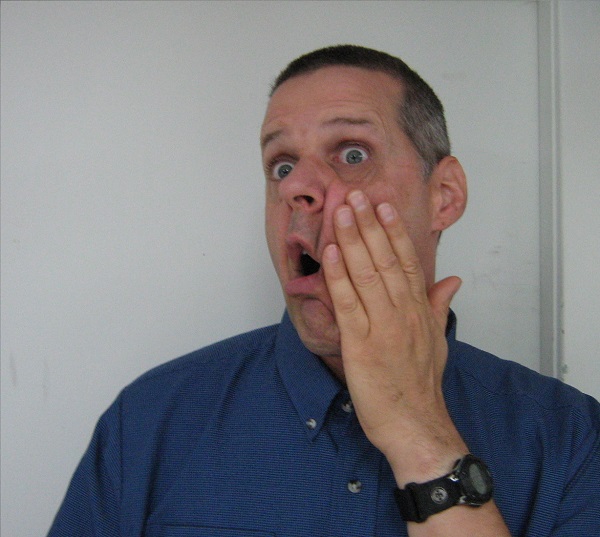
Slap here, to re-establish contact with reality!
The palm is a special case of the Morality finger. The palm is used when arguing with people who have a bad will (which can be yourself in some cases!). Many people try to take refuge in skepticism and moral relativism, mostly so they don't have to shape up their personal lives. It's hard to argue with them, since sooner or later they will deny reality and the possibility of knowing truth. When you are up against such a person, say something like: "It just so happens that I have right here in my pocket a small sample of truth!", then take out your Philosopher's Glove, hold it up in front of you and say: "Is it true that my right hand has five fingers?" If they answer Yes, then you can say: "So we can know some truths!" If they are undecided or start mumbling things about "our senses deceive us", say (jokingly, of course!): "OK, what if you started slapping yourself silly, and while you did that, I'd ask you whether it was true that you were slapping yourself silly?"

Saint Thomas Aquinas showing off his Philosopher's Glove.
Each one of these "fingers" needs to be given a solid theoretical foundation, and more explanations. Moreover, I don't claim that this is a perfect method, which leads to absolute Truth automatically, as if turning the crank of a meat-grinder! But, equipped with this "Handful of common sense", you should be better prepared to begin studying Philosophy and acquire Wisdom.
"Ah yes, really?"
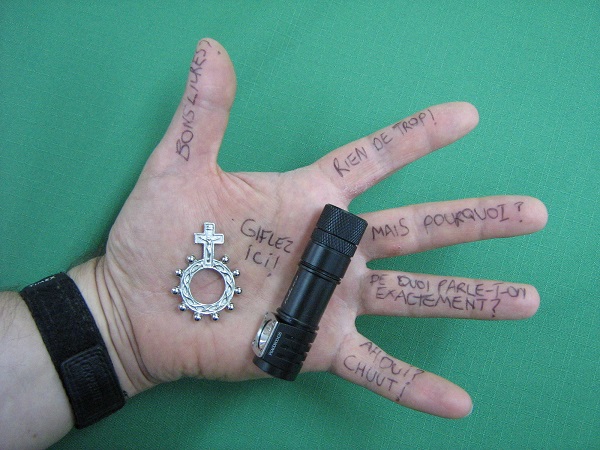
A good handful of physical, intellectual and moral light!
(Note the mini-flashlight, the Finger-Rosary with Enhanced Turbo-Pater ®,
and the Philosopher's Glove - French Edition, equipped with a
Full-Afterburning Slapper, specially designed for use against
Atheists)
Let's Adore Jesus-Eucharist! | Home >> Philosophy